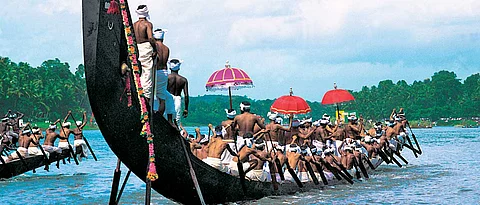
- Destinations
- Experiences
- Stay
- What's new
- Editor’s Picks
- Responsible Tourism
- CampaignsCampaigns
- Subscribe

We know Kerala as one of the most progressive states in the country. It was the first state in the world to democratically elect a communist government in 1957 and today, after 67 years it still exists as one of the few left-reigned states in India. Literacy rates are the highest here and it also boasts of the most equitable distribution of land compared to any other state.
In 1957, E.M.S. Namboodiripad became the Chief Minister of Kerala, leading the world's first freely elected communist administration. This groundbreaking event highlighted Kerala's unique political landscape and set the stage for significant social reforms in education, land redistribution, and healthcare, which contributed to Kerala's high literacy rates and progressive social indicators, distinguishing it from other Indian states.
All this makes sense once you look back at the rich history of this region which goes back to ancient times. An Ashokan edict that dates back to the 300 BC mentions it as the land of the Cheras. It also finds a place in older Sanskrit texts such as the Mahabharata. Pliny and Ptolemy from the ancient Roman Empire too wrote about the flourishing trade in the ancient port of Muziris. St. Thomas, one of the twelve disciples arrived in Kondangallur in 52 AD.
The Cheras' prosperity through their trade with regions all over the world aroused the envy of the neighbouring empires including the Cholas who waged constant wars with the Cheras over a course of a hundred years till the end of the tenth century.
It was only after the arrival of the Portuguese explorer Vasco da game in 1498 to Calicut that direct trade with Europe began. What started as cordial relations between the local rulers called zamorins and the Portuguese in the form of trade eventually turned sour as the Portuguese gradually took over Cochin and turned it into one of their colonies. Soon enough they were followed the the French and the Dutch who took over the region subsequently. By the end of the 16th century, the East India Company acquired it and Cochin turned into one of their most prized possessions and remained so until the country's independence in 1947.
There are quite a few mythological stories about the creation of Kerala as well. One of them centres around the legendary sage warrior Parasurama who is considered to be an incarnation of Lord Vishnu. After destroying all the Kshathriyas, he asked a few learned men to advise him on a way of penance. They asked Parasuram to hand over the lands he had conquered to Brahmins. He agreed and sat in penance at Gokarnam.Impressed by his will,Varuna, the god of the oceans and Bhumidevi, the goddess of earth, gave him their blessing. Later he went to Kanyakumari (Cape Comorin) and threw his battle axe across the waters towards north. As a result, the land of Kerala arose from the sea.
